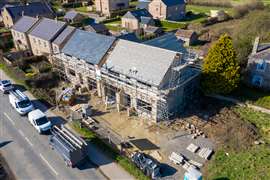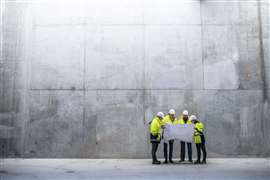Housebuilders list 6 reasons for housing affordability crisis (and 4 ways to fix it)
06 July 2023
 Image: Duncan via AdobeStock - stock.adobe.com
Image: Duncan via AdobeStock - stock.adobe.com
A European-wide group of housebuilders and developers has pinpointed six chief causes for the housing affordability crisis that is gripping some of the world’s biggest economies.
Build Europe, which represents the national federations of developers and homebuilders across 17 different states, warned governments about the global housing crisis, ahead of a G7 meeting of urban development ministers in Takamatsu, Japan on 7 to 9 July.
It said that unaffordability of houses was escalating in all G7 countries, even as the global population continues to grow and to age in the coming years.
It pointed to figures that showed how the price-to-income ratio between the price of a median home to that the median annual household income has soared across most of the G7 nations.
Meanwhile, in the United States of America, the National Association of Home Builders has found that 49% of households (a total of 64.8 million) can’t afford a $250,000 home.
Build Europe identified six key challenges around the world that have contributed to the housing affordability crisis. They are:
- An increase in construction costs: It blamed overregulation, and in particular environmental regulation, for limiting housing supply. It also highlighted rising materials and labour costs.
- A lack of buildable land at affordable prices: Build Europe said that many countries had adopted policies that favour reuse of urban land and industrial wastelands and that the approach of “rebuilding the city on itself” was increasing the price of urban land. Land prices, it pointed out, account for between 20% and 50% of property prices.
- Rising interest rates: The group warned that rising interest rates impacted not just home buyers, but also developers. It claimed that a 1% rise in interest rates corresponds to an 8% loss in purchasing power. Meanwhile, housebuilders also face an increase in housing production costs as a result of rising rates. In a letter to the European Central Bank last month warning of the effect of continued rate rises, Build Europe said, “The leading indicators at our disposal point to a decline in housing production activity ranging from 20% to 40% depending on the country for the year 2023”.
- Weight of taxation
- Falling housing supply, despite a growing population: Build Europe highlighted figures from France’s national institute of statistics, INSEE, which showed that housing production in the country has fallen from a peak of 494,000 units in 2006 to just 358,000 in 2022. It pointed to a similar decline in Germany.
- An insufficient increase in household income
Marc Pigeon, Build Europe’s president, said, “The growth of an ageing population combined with an insufficient and increasingly unaffordable housing supply is a social bomb ready to explode at the global level.
“The G7 governments must consider that access to affordable housing is the keystone of a well-balanced society. Developers and homebuilders are ready to play their part and support policies that reconcile affordable housing with environmental objectives.”
The organisation also set out four areas that it said were key to unlocking greater levels of housing construction. They were:
- Land: It called for planning policies in state, region and metropolitan areas that meet housing needs, as well as greater control over the execution of planning projects, and an acceleration in implementation of projects through a reduction in the time taken to process building permits by harnessing digitalisation. It also called for more rapid processing of contentious planning appeals and a policy of increasing building density and the reclamation of underdeveloped land such as commercial zones.
- Financing: It recommended encouraging private investment in affordable rental housing, as well as financial engineering such as separation of land and buildings and help-to-buy schemes to reduce the cost of housing. And it suggested helping households and in particular first-time buyers financially to purchase ecologically efficient housing.
- Public policies: Build Europe advocated creating comprehensive strategies encompassing employment, housing, education and transport. And it recommended investment in infrastructure to enhance the appeal of medium-sized towns where property costs are lower, as well as reduced taxes and ‘responsible’ deregulation.
- Operators: Finally, the group suggested that both public and private operators should be able to develop a supply of both affordable and social housing under the same conditions, constraints and advantages to encourage more housing construction.
STAY CONNECTED



Receive the information you need when you need it through our world-leading magazines, newsletters and daily briefings.
CONNECT WITH THE TEAM











